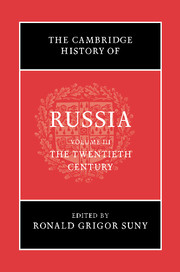Book contents
- Frontmatter
- Introduction
- 1 Reading Russia and the Soviet Union in the twentieth century: how the ‘West’ wrote its history of the USSR
- Part I Russia and the Soviet Union: The Story through Time
- 2 Russia’s fin de siècle, 1900–1914
- 3 The First World War, 1914–1918
- 4 The revolutions of 1917–1918
- 5 The Russian civil war, 1917–1922
- 6 Building a new state and society: NEP, 1921–1928
- 7 Stalinism, 1928–1940
- 8 Patriotic War, 1941–1945
- 9 Stalin and his circle
- 10 The Khrushchev period, 1953–1964
- 11 The Brezhnev era
- 12 The Gorbachev era
- 13 The Russian Federation
- Part II Russia and the Soviet Union: Themes and Trends
- Bibliography
- Index
- References
6 - Building a new state and society: NEP, 1921–1928
from Part I - Russia and the Soviet Union: The Story through Time
Published online by Cambridge University Press: 28 March 2008
- Frontmatter
- Introduction
- 1 Reading Russia and the Soviet Union in the twentieth century: how the ‘West’ wrote its history of the USSR
- Part I Russia and the Soviet Union: The Story through Time
- 2 Russia’s fin de siècle, 1900–1914
- 3 The First World War, 1914–1918
- 4 The revolutions of 1917–1918
- 5 The Russian civil war, 1917–1922
- 6 Building a new state and society: NEP, 1921–1928
- 7 Stalinism, 1928–1940
- 8 Patriotic War, 1941–1945
- 9 Stalin and his circle
- 10 The Khrushchev period, 1953–1964
- 11 The Brezhnev era
- 12 The Gorbachev era
- 13 The Russian Federation
- Part II Russia and the Soviet Union: Themes and Trends
- Bibliography
- Index
- References
Summary
As 1921 dawned, the Bolsheviks could proclaim themselves victors in the civil war and celebrate an accomplishment that would stand as one of the great triumphs in official lore for the rest of the Soviet era. At the same time they presided over a nation whose borders were uncertain and whose peasantry protested ever more aggressively against grain requisitioning and other measures of the civil war that continued beyond the conflict itself. In fact, growing opposition to these exactions was the principal development that convinced Lenin to change course in the direction of what soon became known as the New Economic Policy. By February, in Tambov province alone, tens of thousands of peasant fighters faced Bolshevik commanders who could not be certain of the loyalty of their own troops. Similar peasant violence gripped many other regions, and some areas, notably the lower Volga provinces and Siberia, were not pacified until the summer of 1922. In Moscow, Petrograd and other principal cities, diminishing food rations in the winter of 1920–1 sparked strikes among workers who had backed the Bolsheviks during the civil war. Mutiny at the Kronstadt naval base in March 1921 may have delivered the severest shock, given that the sailors’ support for the Bolsheviks reached back to 1917. But the inflamed countryside had already convinced Lenin that a new approach was required, and he made this clear in March to delegates at the Tenth Party Congress who approved what turned out to be the first major plank of the New Economic Policy.
- Type
- Chapter
- Information
- The Cambridge History of Russia , pp. 168 - 191Publisher: Cambridge University PressPrint publication year: 2006
References
- 1
- Cited by



